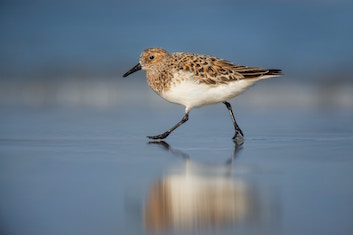Australians love to make a word shorter but occasionally this practice can lead to confusion. The case of the words migrant, emigrant and immigrant (or migration, emigration and immigration, or migrate, emigrate and immigrate) is perhaps the most conspicuous case of perfectly adequate and useful words being cut down to a version that loses the words’ original clear meanings.
- A migrant is a person or animal that regularly moves from one place to another and back again.
Humpback whales migrate from Antarctica every year to warmer waters off the Australian coast.
The tiny sanderling makes one of the longest migrations of any animal, flying from Siberia to southern Victoria.
The annual migration of summer tourists keeps the economy going in many small coastal towns.



- An emigrant is a person (usually) who leaves a country, generally permanently.
Most of my great-grandparents were emigrants from Ireland.
Barnaby Joyce had to resign for not understanding the full implications of his father being an emigrant. - An immigrant is a person (usually) who moves to a new country, generally permanently.
Except for Indigenous peoples, all of our ancestors have been immigrants to Australia.
Unlike many European countries, Australia is a country used to large numbers of immigrants.
What has happened in Australia is that we have tended to swap the word migrant for immigrant. It is worth remembering that the two words are not interchangeable, even though most of our media and most of us use them as if they were. The correct use is still preserved in some places: the Commonwealth government department that deals with people who move to Australia is known as the Department of Immigration.
There has even been a tendency to try to reinvent the wheel to replace the meaning we are losing through our sloppy usage. I have seen an academic attempt to use the words out-migrate and in-migrate when what was meant was emigrate and immigrate.
It is easy to confuse emigration and immigration, because anyone who is an emigrant from somewhere is simultaneously an immigrant to somewhere else.
Martin emigrated from the UK, making him an immigrant to Australia.
But using migrant instead is not a way to compromise between emigrant and immigrant!
An easy way to remember what emigrant and immigrant mean is that emigrant and exit both start with e, while immigrant and into both start with i (when you emigrate you exit; when you immigrate you come into a country).

If you have found this post interesting, you can find a full index to my other posts on the index page. To be notified when I post a new topic, follow me on Facebook! If you have any particular questions you’d like me to answer in future posts, just send me a message. I’m always interested to learn what people think, and how you came across this site, so please post a comment.
If you think you would be interested in either my complete grammar course or an individual customised online course (particularly suited for people who don’t live in Melbourne), just click your preferred option.
Photos: sandpiper (sanderling) by Ray Hennessy, humpback whale by Sho Hatakeyama and beach by Sacha Styles all on Unsplash
2 comments on “Commonly confused words: migrant, emigrant and immigrant”